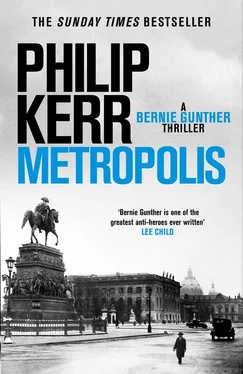‘You did what you thought was right,’ I said. ‘Even if what you did was wrong. That’s what matters. You give people chances. What they do with those chances is their own affair. It’s not down to you if she made mistakes, Angerstein. It’s not down to anyone except the person who makes those mistakes. At least, that’s the way I look at it.’
‘Thanks for that, anyway. Even if you don’t mean it.’
Erich Angerstein’s life story over, we drove on a bit and then he pulled over, parking the car immediately behind the empty Dixi; Emil and his girlfriend had already gone inside the tenement. We followed through one gloomy courtyard and another, then up a narrow stone stairway that smelled of coal fumes and tobacco and fried food and carbolic and something worse. The whole place was like a black-and-white engraving of a deep pit and dry bones scene from The Divine Comedy .
‘Top floor,’ said Angerstein.
I looked up at the side of a building that was all wall cracks and dead concrete window boxes.
‘Suppose he doesn’t answer the door,’ I said. ‘I’m not sure I would answer it in this place and at this time of night.’
‘Then it’s just as well we’re not going to knock,’ said Angerstein.
At the top of the stairs were two apartment doors and, down a small flight of steps, a third, ill-fitting door that led outside again; this door was secured from the other side until Angerstein prised it open with a folding knife. ‘I know all these old tenement buildings like the back of my hand,’ he explained. ‘From when I first started stealing. And other things.’
He led the way out onto an iron fire escape that overlooked a small, dark, rat-infested courtyard. Above us the sky was full of smoke and the sound of a couple having a furious argument — the kind that promised violence. I followed him quietly through a web of washing lines until we came to a grimy window. Inside, the lights were on, affording us a ringside view as Prussian Emil’s girlfriend finished tying his wrists and ankles to all four legs of a kitchen table with a selection of her client’s neckties. She herself was naked but for her boots and stockings and as soon as she was quite satisfied with her knots, she pulled down Emil’s trousers and underpants, picked up a cane and swished it in the air.
‘Looks like we’re just in time for the late show,’ said Angerstein.
‘Somehow I can’t see the Thomas Cook sex tour making it up here.’
‘No, but it saves us time.’
‘How’s that?’
‘You’ve read Kant, haven’t you? A man’s more likely to see reason when his trousers are around his ankles. And there’s no chance of his losing any teeth. Just like you said. It seems to me that he’s just waiting for us to question him.’
He walked along to the next window and while the cellar mistress went about her work, Angerstein silently jimmied it open with his knife and we climbed inside. It wasn’t much of an apartment. A green linoleum floor. A bed that looked and smelled like a nest of mice. A large wardrobe full of fur coats, probably stolen; and on the door, a military uniform and a bugle. We went into the living room where the cellar mistress was caning her client. He took it well enough, I thought, crying out only a little, but seeing us in the room he began to yell loudly — with outrage, not pain.
‘Who the hell are you? Get out of here before I call the police.’ And other words, most of them obscene, to that effect.
‘What’s the twenty-mark word for this particular perversion?’ Angerstein asked the mistress. ‘Algolagnia?’
The mistress nodded. Angerstein handed her a banknote.
‘Get your clothes on, darling. Go home. Forget you ever saw us. We’ll finish up here with the algolagnia.’
The woman grabbed her clothes and ran. She could tell we meant business. For one thing, Angerstein had a gun in his hand.
‘Put the Bismarck away,’ I told him. ‘We won’t need it. Not now he’s trussed up and ready for some Socratic dialogue.’
He shrugged and slipped the pistol into a little holster on his belt.
‘I don’t pretend to understand why anyone would want to be punished like this,’ he said, picking up the cane. ‘But it takes all sorts. Especially in Berlin. Personally, I put it down to the armistice. We’re still beating ourselves up for the way the war ended. Or paying someone else to do it.’
‘What the hell do you want?’ demanded Emil.
‘Answers to some questions,’ I said, pulling a chair up beside his head, which was the much-preferred alternative to the other end of the table. His wig had disappeared and the birthmark on his neck was just as Johann Tetzel had described; it looked as if a careless waiter had spilled something down his shirt collar. ‘As soon as we have those answers we’ll leave you alone. If you’re good, we may even untie you before we leave. Simple as that.’
‘And who wants to know the answers?’
‘Let’s get something straight,’ Angerstein said, and hit him hard on his bare backside with the cane, which had me wincing with vicarious discomfort. ‘We ask the questions.’
‘Yes, yes, yes. Whatever it is you want to know, I’ll tell you.’
‘A few weeks ago,’ I continued, ‘you went on a job one night with your friend Karl Szatmari. South of Wittenbergplatz, at the back of a building on Wormser Strasse. I found your klutz wagon. You were his achtung . That horn in the bedroom: You were meant to blow it if the cops turned up.’
‘Who says?’
Angerstein beat him again. ‘Answers only, please. Not questions.’
‘I’m not interested in any of that. What I want to know is why you ran away. What you saw that made you abandon the klutz wagon and leg it.’
‘I haven’t a clue what you’re talking about,’ insisted Emil. ‘You’re right. I used to play schnorrer and spot cops for Szatmari when he was on a job. Yokel catching. I plead guilty to that. No question. But I lost that wagon on Wittenbergplatz. Had to make a run for it when a nosy cop started asking me awkward questions. I’ve no idea how it turned up where you said it did. But Wormser Strasse isn’t so far away from Wittenbergplatz.’
‘A woman was murdered that night,’ I said. ‘Murdered and mutilated. And I think you caught a glimpse of the man who was responsible. I believe that’s the reason you ran away. Because you were afraid he might kill you, too.’
‘Whatever gave you that idea?’
Angerstein beat him a third time and Emil’s face turned an interesting shade of purple. ‘Didn’t they teach you anything at school?’ he said. ‘The difference between a question and an answer?’
‘All right, all right. And not so hard, eh? I’ve told you. I’ll tell you whatever you want to know.’
‘So far you’ve told us nothing,’ said Angerstein.
‘Look, Emil, there was a burglary in Wormser Strasse on the same night as the murder. That’s a fact. And I’m guessing it was Szatmari who was responsible. If we ask him and he says it was you who was cop-spotting for him, and we have to talk again, then my friend here is going to do more than just beat you. But you shouldn’t worry about that. You should worry about what’s going to happen right now.’ I lit a cigarette. ‘This is your last chance, Emil. If I have to ask you the same questions once more I’m going to tell my colleague to beat you like an old carpet. And when he’s tired of doing that, then I’m going to beat you myself. Which will be worse because I won’t enjoy doing it. Not for a moment. I’ll be very embarrassed and because I’m embarrassed I’ll be angry. Maybe angry enough to beat you harder than anyone has ever beaten you before. You understand? So I urge you to start telling me some things I don’t already know. Before you really do get hurt.’
Читать дальше












